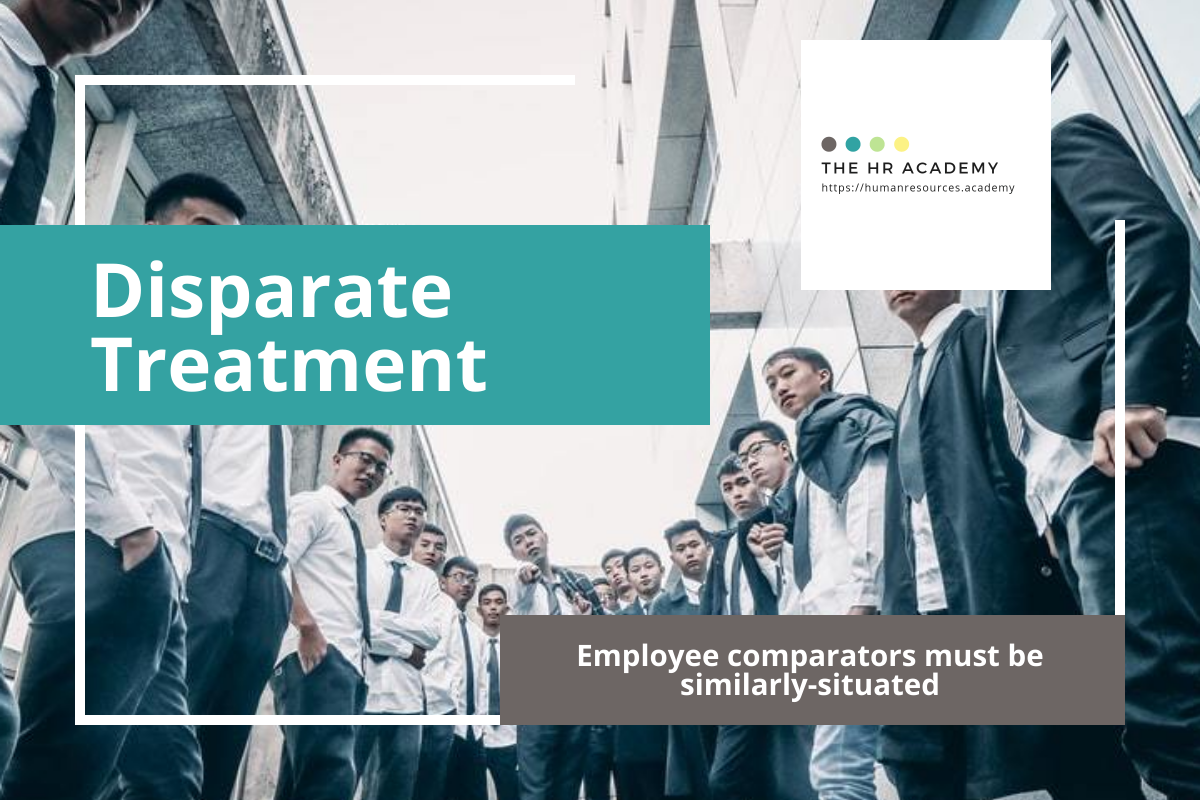Avoiding Disparate Treatment and Understanding Comparators

Disparate-Treatment-01
What Would You Do?
Q. How would you respond? An employee comes to you and complains that she is being treated differently than other employees because she has medical restrictions in place due to a heart attack; the organization is placing her on administrative leave for an inability to perform the essential functions of her job. Other employees have failed fitness-for-duty exams in the past, but she feels the employer is targeting her and treating her differently because of her race and sex.
Q. What would you recommend? In the situation above, the employee indicates she intends to file a discrimination claim with HR and then the Equal Employment Opportunity Commission because she believes the actions against her constitute illegal discrimination. In your current role, what would you say or do in response?
Disparate-Treatment-01-PPTThe Case
In Lewis v. City of Union City, Georgia, the 11th Circuit Court of Appeals held that a “comparator” in anti-discrimination claims must be similarly situated in all material respects. Jacqueline Lewis, an African-American woman, suffered a heart attack the year after her promotion to detective, but was cleared to return to work without restrictions. When the Police Chief announced a new policy requiring officers to carry Tasers and pepper spray, Detective Lewis’s physician recommended that she not be near either, due to her previous heart attack and chronic conditions. The City placed her on leave and then terminated her, claiming she could not perform the essential functions of her position. Lewis sued for race and gender discrimination under Title VII, the Equal Protection Clause, and 42 U.S.C. § 1981. Lewis offered two comparators who had failed a physical fitness test. In one case, the comparator passed the test on the second attempt. In the other, the employee was terminated. The 11th Circuit held that an employee and her comparators “must be sufficiently similar, in an objective sense, that they ‘cannot reasonably be distinguished.’” Id. at 1228 citing Young, 135 S.Ct. at 1355. In this case, Lewis did not meet her burden to show that her comparators were sufficiently similar to her.
Lewis v. City of Union City, Georgia, 918 F.3d 1213 (11th Cir. 2019).
Employment Best Practices
“In McDonnell Douglas Corp. v. Green, 411 U.S. 792, 5 EPD Par. 8607 (1973), the Supreme Court created a template for establishing a case by inference. It stated that a plaintiff can establish a prima facie case of discrimination by showing:
1. (s)he belongs to a protected group under Title VII;
2. (s)he applied and was qualified for a job for which the employer was seeking applicants;
3. despite his/her qualifications, (s)he was rejected; and
4. after his/her rejection, the position remained open and the employer continued to seek applications from persons of complainant’s qualifications.
Id. at 802.2 If the plaintiff establishes a prima facie case through the four-part approach set out in McDonnell Douglas, (s)he will have raised an inference that the employer acted with a discriminatory motive.”
More available at EEOC.gov
The Bottom Line
Under the McDonnell Douglas burden-shifting framework, an employee has the burden to demonstrate that she was treated differently from other individuals who were similarly situated. The 11th Circuit clarified that this includes all material respects of the treatment in question.
Disclaimer: Nothing in the HR Academy’s Expert Toolkits and online resources constitutes legal advice. Our informative resources provide Human Resources professionals with useful information related to federal employment law and recent court cases in a variety of jurisdictions. Always consult an attorney with employment law questions. Also note that not all cases in the Academy’s Expert Toolkits constitute mandatory authority in every jurisdiction. While Supreme Court cases are mandatory authority, circuit court decisions and U.S. District Court decisions relate to the specific jurisdiction in which the case was heard. The HR Academy does not provide legal advice, and our Expert Toolkits are provided solely as informational supplements for training and staff development.